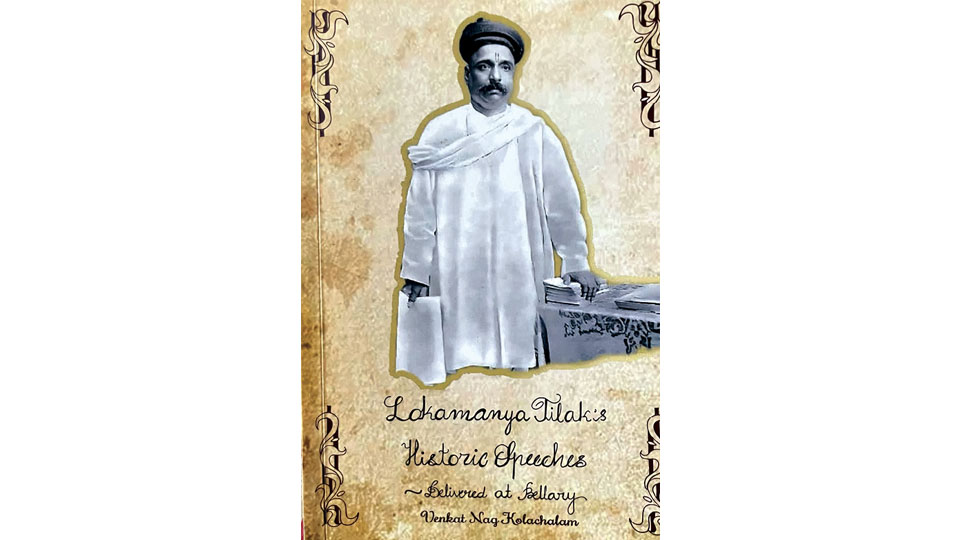Title: Lokamanya Tilak’s Historic Speeches
Compiler: Venkat Nag Kolachalam
Year: 2024
Pages: 110
Price: Rs. 250
Publisher: Sreenatha Joshi, Punarutthaana, Ballari
By Gouri Satya, Sr. Journalist
Endeared as ‘Lokamanya,’ Bal Gangadhar Tilak was a fire-brand freedom fighter, who ceaselessly worked to help the country break away from British rule. His celebrated assertion “Swaraj is my birthright and I shall have it” had a magical effect. It stirred the masses who took up his assertive declaration as a slogan in their fight for freedom. Admiring his patriotism and fight for the cause of freedom, his followers gave him the title ‘Lokamanya.’
During his tour to awaken the masses, Lokamanya Tilak visited Bellary (now Ballari) and delivered two historic speeches in 1905. He spoke on “Patriotism” during the inauguration of Vani Vilasa Drama Theatre. The second lecture was advice to students and young men while addressing the Bellary Literary Society.
In the first lecture, he defined a nation and explained what was patriotism. He went on to say that the first duty of an Indian Patriot is to see whether we are a nation. If we do not expect India to be a nation, she will never be a nation, he said. He was very clear in his statement when he said if there is no nation there is no patriotism. If there is already a nation, then to work for the good of it is patriotism. If there is no nation, a patriot has to make one.
Here, we must remember Tilak was addressing the gathering before Independence and hence his speeches were more of a nature of inspiring people towards that cause. He made powerful assertions about Swaraj, stressing how it is important for a nation. But it did not end just there, his message had a message for the future, a national reawakening, when he said that all provinces that have come together should remain united and live like one man. He did not forget to emphasise social reforms, economic growth and education that were necessary for making a good nation and keeping them united.
Tilak said differences in race, religion, languages or whatever the other provincial differences and social customs, are not the essentials. “The ethnological elements are the same in all. Their mother country is the same, the same blood runs in their veins. The inner man is the same.” We must be more liberal, more broad-minded and work for the good of the races living in different provinces of the country, and to a certain extent as Lord Curzon had said, ‘Composite Patriotism.’
“That is the ideal, that is the Patriotic work that we Indians have to do. Nationality should be our ideal and nation formation should be our goal,” he underlined.
“To sum up, Patriotism involves nationality and bringing all races together. Patriotism must be composite. The limits must be widened and when we widen these limits we accept the Composite Patriotism of Lord Curzon,” Lokamanya Bal Gangadhar Tilak concluded.
While addressing students and young men, he highlighted the limitations of education which had the limited objective of turning out men and women for subordinate services, taking them away from their roots. His experience as a teacher was that education was defective and one-sided. They did not receive religious education or any training as to how to conduct themselves in society. They knew nothing about the industrial development and knew very little about the political ideals by which their life ought to be governed. They knew very little about the history of other nations and what their duties were towards their own country. They knew nothing about the ceremonies performed in their houses and rudely opposed old social customs and habits.
“With so many defects in the education that is imparted to you, you go into the world,” he lamented and added it was the duty of the rulers to see that knowledge is imparted to the students of the country in fullness and every detail.
The education that is imparted in schools and colleges should be a ‘living education’ and not aim at making them just fit for subordinate services in the Government. Even when they are serving the Government of the country, the interests of the country must be above those of the Government. They must not sell themselves and their principles to the Government for the salaries they get, Tilak advised the students.
“Do your duty boldly if you accept service under Government and serve the interests of your master. But at the same time do not sacrifice your individuality or independence of opinion. If you follow this line of conduct you will be doing great good to your people, to the country, and also to the Government. Your first duty is to find out what you can do for your country.”
“Think deeply, resolve promptly and act fearlessly,” he advised the young men, concluding his speech.
Tilak was invited to Bellary by Nyayavadi Kesari Venkat Rao Kolachalam, a great nationalist, to inaugurate the drama theatre, which he had built in Bellary, a prominent centre of theatre activity. The two speeches had been originally published by Rama Vilasa Press, which was owned by Venkata Rao. His second great-grandson Venkat Nag Kolachalam, who currently resides in the US, has compiled and brought out a revised edition of the book “Lokamanya Tilak’s Historic Speeches.” It includes a message from former Vice-President of India Venkaiah Naidu and foreword by well-known writer and Senior Journalist Babu Krishnamurthy. Some old photos and maps add to the importance of the book.








Recent Comments